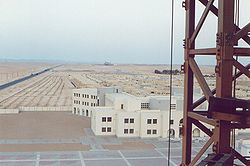Hun, Libya: Difference between revisions
Kwamikagami (talk | contribs) |
Kwamikagami (talk | contribs) ipa |
||
| Line 123: | Line 123: | ||
|footnotes = |
|footnotes = |
||
}} |
}} |
||
'''Hun''' or '''Houn''' ({{lang-ar|هون}} ''Hūn'') is an [[oasis]] town in the northern [[Fezzan]] region of southwest [[Libya]]. The town is the capital of the [[Al Jufrah District]]. |
'''Hun''' or '''Houn''' {{IPA-en|ˈhuːn|}} ({{lang-ar|هون}} ''Hūn'') is an [[oasis]] town in the northern [[Fezzan]] region of southwest [[Libya]]. The town is the capital of the [[Al Jufrah District]]. |
||
==Geography== |
==Geography== |
||
Revision as of 21:52, 2 September 2011
This article needs additional citations for verification. (March 2011) |
Hun
هون | |
|---|---|
 A view from modern Hun, Libya | |
| Country | |
| Region | Fezzan |
| District | Al Jufrah District |
| Population (2010)[1] | |
• Total | 30,715 |
Hun or Houn /ˈhuːn/ (Template:Lang-ar Hūn) is an oasis town in the northern Fezzan region of southwest Libya. The town is the capital of the Al Jufrah District.
Geography
Hun is about halfway between Sebha and the Mediterranean coast in the Sahara desert. The modern city of Hun is 150 years old.[when?]
The natural landscape around Houn mainly consists of black basalt mountains, with extensive sand dunes, and date palm trees - Phoenix dactylifera groves indicating oases.
Villages of Waddan and Socna are the nearest settlements. There is a ruined ksar and several mosques in the village of Waddan. All three towns are oases characterized by the abundance of natural springs and date palm trees.
Transportation
There are public buses to the cities of Sirt and Sabha. There is also a military airport located between Houn and Waddan. Houn is 250 km South of Sirte, 500 km from Misrata and 350 km North of Sabha. [2]
History
The original town, named Miskan and around 500 years old, is located 4 km. southeast of the modern town. There are ongoing archaeological excavations at the site.
During the 2011 Libyan civil war, on May 8, 2011, NATO hit 8 headquarters compound buildings, 12 ammunition storage and 20 vehicle storage.[3]
Italian Libya
During the colonial Italian Libya period, Houn was the administrative capital of the Italian Fezzan region, called Territorio del Sahara Libico. Houn was the Italian military center of southern Italian Libya, and was not part of the national Fourth Shore territory of the Kingdom of Italy as Italian Tripolitania and Italian Cyrenaica were.
A small Libyan Italian community of 1,156 people lived in Houn, which was called Homs in the colonial years. [citation needed] In the 1939 census they were 3% of the total population of 35,316 in the city. They disappeared from Houn after Italy's loss of Libya in World War II. An important Libyan Italian born in Houn was the internationally renowned painter Mario Schifano (1934–1998).
In the 1930s the Italian government made some important improvements to the small town, including a connection to the coast via the new Fezzan Road.
Features
The "International Autumn Tourism Festival", is an annual festival usually held at the end of September.
- Accommodations
There is one hotel and one hostel in Houn.
